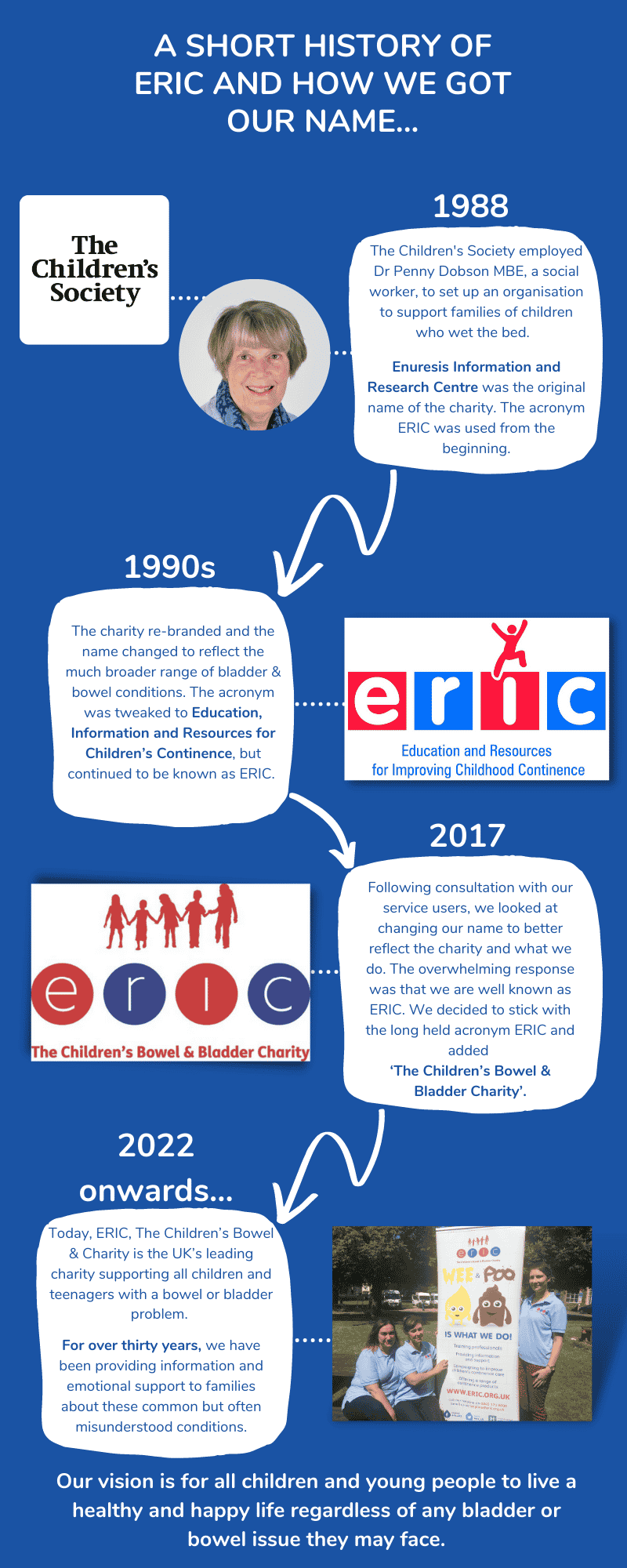About us
ERIC, The Children’s Bowel & Bladder Charity is the UK’s leading charity supporting all children and teenagers with a bowel or bladder problem.
Why ERIC you may wonder?!
Well, our official title since ERIC was set up back in the 1980s is: Education And Resources For Improving Childhood Continence.
In 2016, we decided to simplify things by adding 'The Children's Bowel & Bladder Charity' after our name.
We are also well known as the wee and poo experts!
Vision
For all children and young people to live a healthy and happy life regardless of any bladder or bowel issue they may face.
Mission
To get everyone talking openly about good bladder and bowel health; to empower children and carers with support, information and resources; to contribute to research and policy development and to deliver the best education and advice to all those working with families.
For over thirty years, we have been providing information and emotional support to families about these common but often misunderstood conditions.
1 in 12 children in the U.K. are affected by a bowel or bladder condition including constipation, soiling and wetting accidents and bedwetting. The impact on their life, and their family's, can be devastating.
The embarrassment and shame surrounding these continence problems, means that many young people and their families suffer in silence with no-one to turn to.
The actions we take and decisions we make at ERIC aim to reduce the impact of bowel and bladder issues on children’s and teenagers lives in the UK by:
- Improving the social environment for children, young people and families in relation to bowel and bladder issues
- Enabling children, young people and families to make informed choices about bladder and bowel issues.
- Increasing early intervention into (or early prevention of) childhood bowel and bladder issues
- Providing equality of access to information and services for all
The impact of getting the right support and information to deal with a continence difficulty can be dramatic: children can start living a normal life, they can take part in social activities, they feel happier and more confident, and the strain on family life is lifted.
Our services
Free helpline
Information and resources
Events for families
Training education & early years workers
Training the NHS
Selling products for managing continence conditions
Why it matters
Battling a wetting or soiling problem can ruin a young person’s life. Living in constant fear of the next accident, particularly if it happens at school or with friends.
Many affected children struggle with anxiety, depression and low self-esteem. Cruel name calling and bullying are commonplace, and many young people feel isolated and alone.
Because of their condition, children and young people miss out on school trips, sports days and sleepovers. Many struggle with their education, missing school because of their health issues. In some cases, children are being pulled out of school to be home-schooled because of a lack of available support in schools.
“I dreaded going to school and was always thinking about when the next soiling incident would happen. Some of the teachers were ok if I needed to go to the toilet in a lesson. Others made a fuss, and it was so embarrassing. I kept my distance from other kids at break and lunch time as I was always worried about the smell. But having no one to hang out with was so lonely. I hated my life.” Freya, 14.
Even before the arrival of Covid-19, anxiety, depression and other mental health issues amongst young people were at an all-time high.
In summer 2019, 318 parents/carers responded to an ERIC survey looking at the impact of bladder and bowel conditions on families. They told us that 14% of children missed more than a month of school due to their bladder or bowel condition.
And the impact is felt across families. 74% of parents/carers who responded to the above survey lost time off work, with 13.5% reporting they had taken off more than 20 days. A childhood continence problem affects the whole family, and for some, the strain can bring them close to breaking point.
The financial burden of nappies and continence pads, constant cycle of washing clothes and replacing soiled ones can put an added burden and the emotional toll on those families whose day to day lives are restricted by trying to cope with a medical condition that they feel they can’t talk about.
“Before the day has started my daughter wakes up, knowing that she’s wet the bed and that it smells. We must dig deep to remain patient and understanding. She needs to be reminded that we don’t blame her in any way and we’re not angry with her. Sometimes after I’ve loaded the washing machine with sheets and duvet covers for the tenth time of the week I feel like crying - not for me, for her, because she has to bear this struggle.” Julie.
Who we work with
Partnerships are at the heart of our approach, enabling us to reach more young people and have a stronger voice in influencing policy and achieving change.
From research collaborations with universities and national charities, to partnerships with commissioners and national funder and grassroots work in education and health settings.
These include:
- The University of Bristol, Centre for Academic Child Health
- Bladder and Bowel UK (BBUK)
- Bowel and Bladder Confidence Health Integration Team (BABCON)
- National Bladder and Bowel Health Programme (NBBH) led by NHS England
- Paediatric Continence Forum (PCF)
- School and Public Health Nurses Association (SAPHNA)
How we are funded
We operate a mixed funding model to reduce risk and ensure that we don’t become over reliant on any one source of income.
Our income comes from:
- trusts and foundations
- training net income
- donations
- corporate sponsorship
- online shop net income
- research & NHS project funding
Our history

Upcoming events
Share this page
